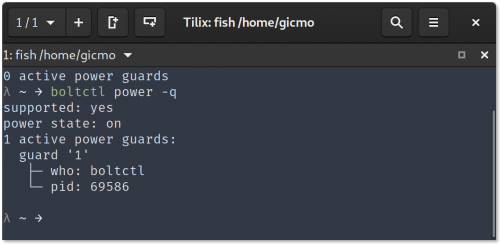As readers of this blog might remember, there is a mode where the firmware (BIOS) is responsible for powering the Thunderbolt controller. This means that if no device is connected to the USB type C port the controller will be physically powered down. The obvious upside is battery savings. The downside is that, for a system in that state, we cannot tell if it has a Thunderbolt controller, nor determine any of its properties, like firmware version. Luckily, there is an interface to tell the firmware (BIOS) to "force-power" the controller. The interface is a write only sysfs attribute. The writes are not reference counted, i.e. two separate commands to enable the force-power state followed by a single disable, will indeed disable the controller. For some time boltd and the firmware update daemon both directly poked that interface. This lead to some interference, leading in turn to strange timing bugs. The canonical example goes like this: fwupd force-powers the controller, uevents will be triggered and Thunderbolt entries appear in sysfs. The boltd daemon will be started via udev+systemd activation. The daemon initializes itself and starts enumerating and probing the Thunderbolt controller. Meanwhile fwupd is done with its thing and cuts the power to the controller. That makes boltd and the controller sad because they were still in the middle of getting to know each other.

boltctl power -q can be used to inspect the current force power settings
To fix this issue, boltd gained a force-power D-Bus API and fwupd in turn gained support for using that new API. No more fighting over the force-power sysfs interface. So far so good. But an unintended side-effect of that change was that now bolt was always being started, indirectly by fwupd via D-Bus activation, even if there was no Thunderbolt controller in the system to begin with. Since the daemon currently does not exit even if there is no Thunderbolt hardware1, you have a system-daemon running, but not doing anything useful. This understandably made some people unhappy (rhbz#1650881, lp#1801796). I recently made a small change to the fwupd, which should do away with this issue: before making a call to boltd, fwupd now itself checks if the force-power facility is present. If not, don't bother asking boltd and starting it in the process. The change is included in fwupd 1.3.3. Now both machine and people should be happy, I hope.
Footnotes:
- That is a complicated story that needs new systemd features. See #92 for the interesting technical details.
Pingback: Links 14/11/2019: Mesa 19.2.4 and GCC 7.5 Released | Techrights